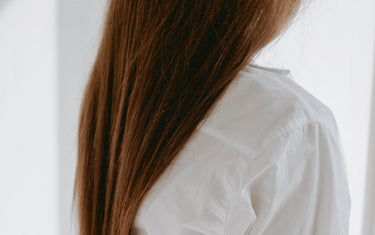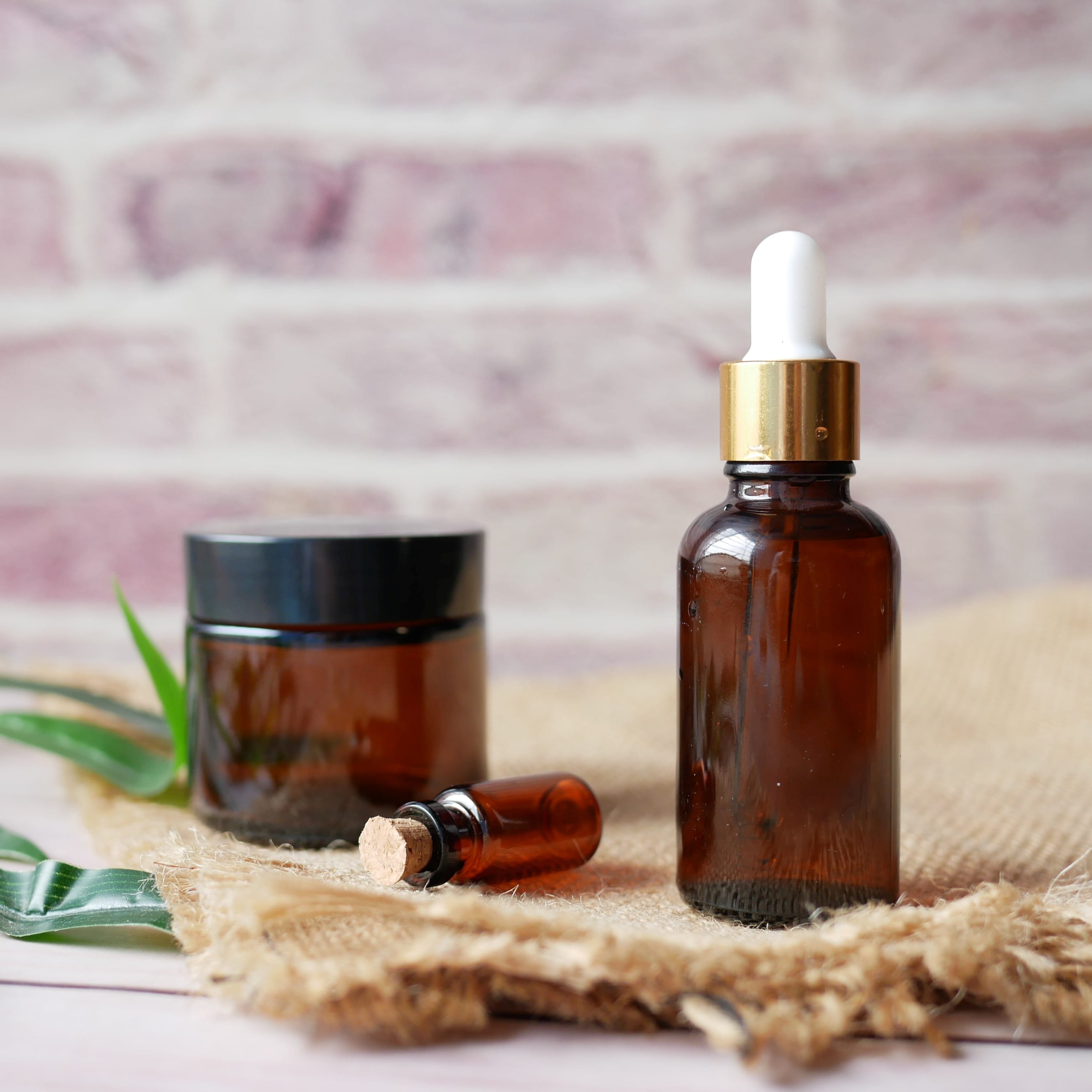7 min read / 14 November 2022 / Laura Garvin Gomez
7 Best Carrier Oils for Hair
Looking for a natural way to give your hair a nourishing boost? These oils can help.

There is a growing focus on natural and clean beauty, with people becoming increasingly wary of the chemical mixtures used in commercial products.
This is especially true of haircare, as we only get one set of hair and how it looks heavily influences the way we feel about ourselves.
Carrier oils and essential oils offer a great alternative to commercial products, as they are packed with all kinds of natural benefits that can help your hair flourish.
Here we look at the best carrier oils for hair so you can decide what works best for you, as well as some of the most impactful essential oils to pair them with.
The best carrier oils for hair1. Argan oilArgan oil helps to maintain moisture levels of the hair shaft and reduces the appearance of frizz. Argan oil for hair is well-known for its nourishing benefits. 2. Grapeseed oilGrapeseed oil helps to protects against environmental stressors and is beneficial for the scalp. 3. Jojoba oilJojoba oil reduces the appearance of dandruff and frizz and helps to lock in moisture in the hair shaft. 4. Coconut oilCoconut oil helps protect hair from UV rays and prevents breakage and improves the overall health of your hair. 5. Castor oilCastor oil is great for hair growth and hair loss, helping to make hair feel less dry and protecting your hair follicles. 6. Sweet almond oilSweet almond oil improves the strength and shine of hair and combats environmental stressors helping to keep your hair looking healthier and younger. 7. Avocado OilAvocado oil helps to moisten and nourish hair, and also helps to reduce signs of dandruff by stimulating blood flow to the scalp. Carrier oils are incredibly versatile products, and while some of them may seem similar, they each carry something unique to keep your haircare routine in top form. If you are unsure, research what is carrier oil for hair to find the right one for your needs. |
How to use carrier oils for hair
- Choose a carrier oil suited to your hair type. You could also combine with beneficial essential oils for hair.
- Pour out a tablespoon and use your hands to massage into your scalp and hair strands.
- Leave the mixture in for a minimum of 30 minutes or for optimal results leave in overnight.
- Rinse off your hair mask in the shower.
- Repeat every week or two to see results!
Why is argan cold pressed carrier oil the best for hair?
Argan oil is extracted from the fresh kernels of the fruit of the argan tree found in Morocco.
The oil has been shown to offer a range of benefits for your hair and scalp, thanks to it being high in antioxidants such as vitamin E and fatty acids.
Oleic acid and linoleic acid properties can help to lubricate the hair shaft end and maintain moisture levels, while the vitamin E adds a fatty layer to your scalp and hair that can reduce frizziness, prevent dryness and boost shine. If you need the best carrier oil for hair, this is one worth considering.
Can grapeseed carrier oil help protect hair?
You’ll find a strong mixture of carotenoids, omega-3 and omega-6 fatty acids in grapeseed carrier oil, along with a polyphenol called OPC, which are all beneficial for your scalp and hair.
It is also high in vitamin E, which acts as a strong combatant against free radicals and can improve protection against environmental stressors like the sun, wind and pollution.
Grapeseed oil contains linolenic acid, which isn’t naturally produced by the human body, but it helps with organ function and contributes to the overall health of our hair.

Why should I use Jojoba carrier oil for my hair?
Jojoba oil is closer to a wax than an oil, so it is similar to the structure and function of the sebum naturally produced by our skin.
It’s a hugely popular choice for natural hair care due to it being rich in antioxidants and vitamin E, which can help with scalp flaking, redness and itching.
You may also be able to reduce the appearance of dandruff due to its natural antibacterial and antifungal agents.
Jojoba oil forms a protective coating over each strand of hair, which helps to lock in moisture, reduce frizz and make hair that little bit softer and shinier.
Is fractionated coconut carrier oil good for hair?
While they sound similar, there is a key difference between standard coconut oil and fractionated coconut oil.
As the name indicates, it is a fraction of coconut oil, where the fatty acids have been separated.
Long-chain fatty acids are removed to leave only medium-chain fatty acids and saturated fatty acids behind, which is great for skin and hair.
This process also helps to keep the oil a liquid at room temperature - unlike regular coconut oil which solidifies if not warmed.
You can use it as a sunscreen for your hair, with the microelements offering protection against UVB and UVA rays.
While fractionated coconut oil doesn’t have a direct influence on hair growth, it does help to improve its overall health, which can help to prevent breakage and encourage healthier all-round hair.

Can castor carrier oil help a dry scalp?
The natural antiviral and antimicrobial properties contained in castor oil makes it a popular choice for skin conditions such as dermatosis and fungal infections.
Many people believe it is one of the best carrier oils for hair growth and for combatting hair loss, although there is not hard clinical evidence that can confirm it does make hair grow.
However, it can help to smooth outer protective hair follicles and because it is an emollient, it could help your hair feel less dry.
Applying castor oil to the hair involves coating hair shafts, which can protect hair breakage and future hair damage.
Does sweet almond carrier oil help promote shine?
Sweet almond oil is sourced from the seeds of the almond tree and contains several proteins, omega-9 fatty acids and vitamin E – all of which suggests it could improve the strength and shine of your hair.
As an emollient, it fills in the gaps in your hair at a cellular level, which can give your hair a smoother texture over time.
Vitamin E is a natural antioxidant, which is good news when it comes to combating the environmental stress faced by your hair on most days, helping to keep your hair looking healthier and younger.
Best Carrier Oil for Oily Scalp
When dealing with an oily scalp, it’s important to choose carrier oils that balance moisture without adding excess oil. Here are some of the best carrier oils for oily scalp:
- Jojoba oil – Mimics natural sebum, balancing oil production and helping to reduce excess scalp oil.
- Grapeseed oil – Lightweight and rich in antioxidants, it helps regulate oil levels without clogging pores.
- Argan oil – Nourishes without making hair greasy, making argan oil for hair a great option for those with oily scalps.
These oils are ideal for promoting a healthy scalp without exacerbating oiliness.

What are the best essential oils for hair?
While carrier oils may be incredibly nourishing on their own, they are arguably even more powerful when combined with essential oils.
Essential oils not only contain a greater spectrum of unique benefits, but can also help your hair smell nicer and make it feel more enriched.
Some of the best essential oils for hair include:
Is rosemary essential oil good for hair growth?
Claims have been made in recent years that rosemary essential oil can help your hair grow or even prevent hair loss, although beyond benefiting nerve tissue, no solid link has been made to support these claims. [1]
However, it can help to improve circulation in your scalp when massaged into the skin and also help with dandruff and dry scalp.
When applied to hair strands, it could reduce hair breakage and split ends, which can lead to healthier looking hair.
Check out our rosemary oil for hair and its benefits.
Does peppermint essential oil stimulate hair?
Peppermint essential oil is perhaps best known for its skin care benefit, although it can do wonders for your hair and scalp too.
The oil is antimicrobial, anti-inflammatory and analgesic and the menthol found in peppermint can help to improve blood flow.
A study also suggested that it can help to increase dermal thickness, follicle numbers and follicle depth, thanks to its menthol properties.
Regular application of peppermint oil can also help to balance the pH of your scalp, which regulates oil production and can make your hair feel less greasy.
Can cedarwood essential oil improve hair health?
If you suffer from a dry scalp, cedarwood essential oil could be a good solution to help improve its condition, and is another excellent essential oil to consider for your hair.
Its anti-inflammatory properties help to soothe the scalp and prevent dermatitis, with regular scalp massages using cedarwood reducing the appearance of irritations and dry flakes.
You can use the oil to improve blood circulation and hair follicle health, and also reduce split ends, hair thinning and breakage, making it a great addition to your hair care routine.
Discover more of the best essential oils for your hair.

As you can see, when it comes to treating your hair and improving its condition, there are lots of options available.
Sometimes it’s a case of trial and error, but even if you don’t find the right match at first, applying any carrier oil or essential oil to your hair can offer more than standard commercial products.
Take your time to do some research before buying and once you get started with a new routine your hair will love you forever.
Interested in buying in bulk? Sign up for Nikura’s wholesale program and get access to exclusive discounts and offers.
References
[1] Hidemi Yoshida et al. (2011) Edaravone and carnosic acid synergistically enhance the expression of nerve growth factor in human astrocytes under hypoxia/reoxygenation https://www.sciencedirect.com/science/article/abs/pii/S0168010211000022









